Step-by-step guide on How to Peel and Cut Butternut Squash safely! Once you learn the easiest way to chop it, you will be roasting the cubes in the oven and using them in soups, salads and side dishes.
Once you have mastered this skill, be sure to check out this recipe for sauteed butternut squash. Or here is how to roast butternut squash whole or pressure cook it whole if you rather skip dicing it.
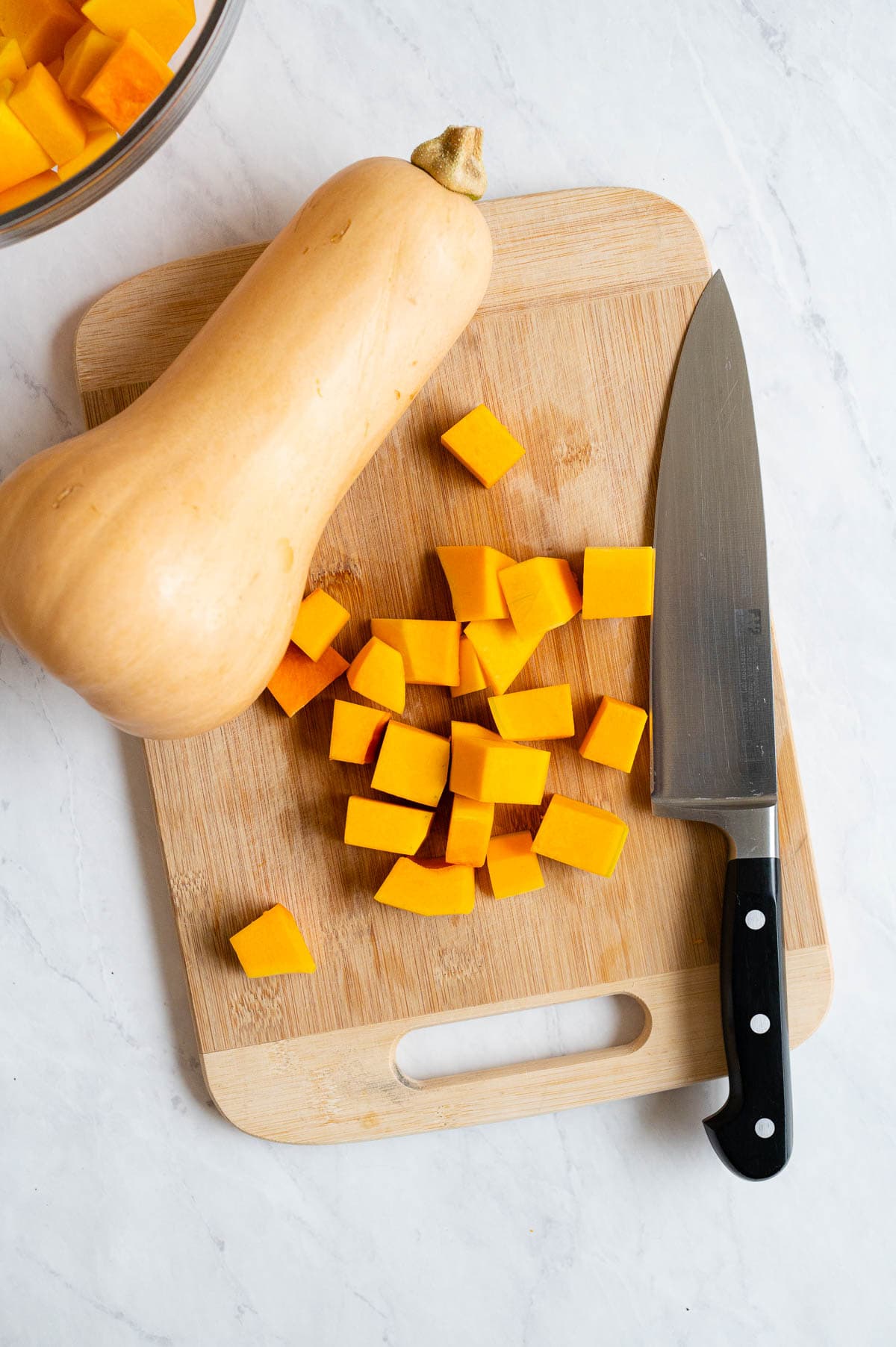
Table of contents
As delicious as butternut squash is, I have to admit it can be intimidating to cut through its thick skin! That’s why I have made it my mission to find the best way for how to peel and cut butternut squash.
In this step-by-step tutorial, you will learn how to dice butternut squash without fear of putting your fingers in harm’s way. It’s the best way, an easy way and the safest way, I promise.
Before you know you will be cooking it in all your favorite recipes! Here are my best tips for frustration free butternut squash prep from how to select it, how to peel and cube butternut squash, to how to store it.
What Does Butternut Squash Look Like?
First thing before learning how to cut squash, you need to know how to identify it to purchase!
This variety of winter squash is found in abundance at the grocery store and farmer’s markets during the fall and early winter. You will recognize it by its light tan exterior, long neck, and round bottom.
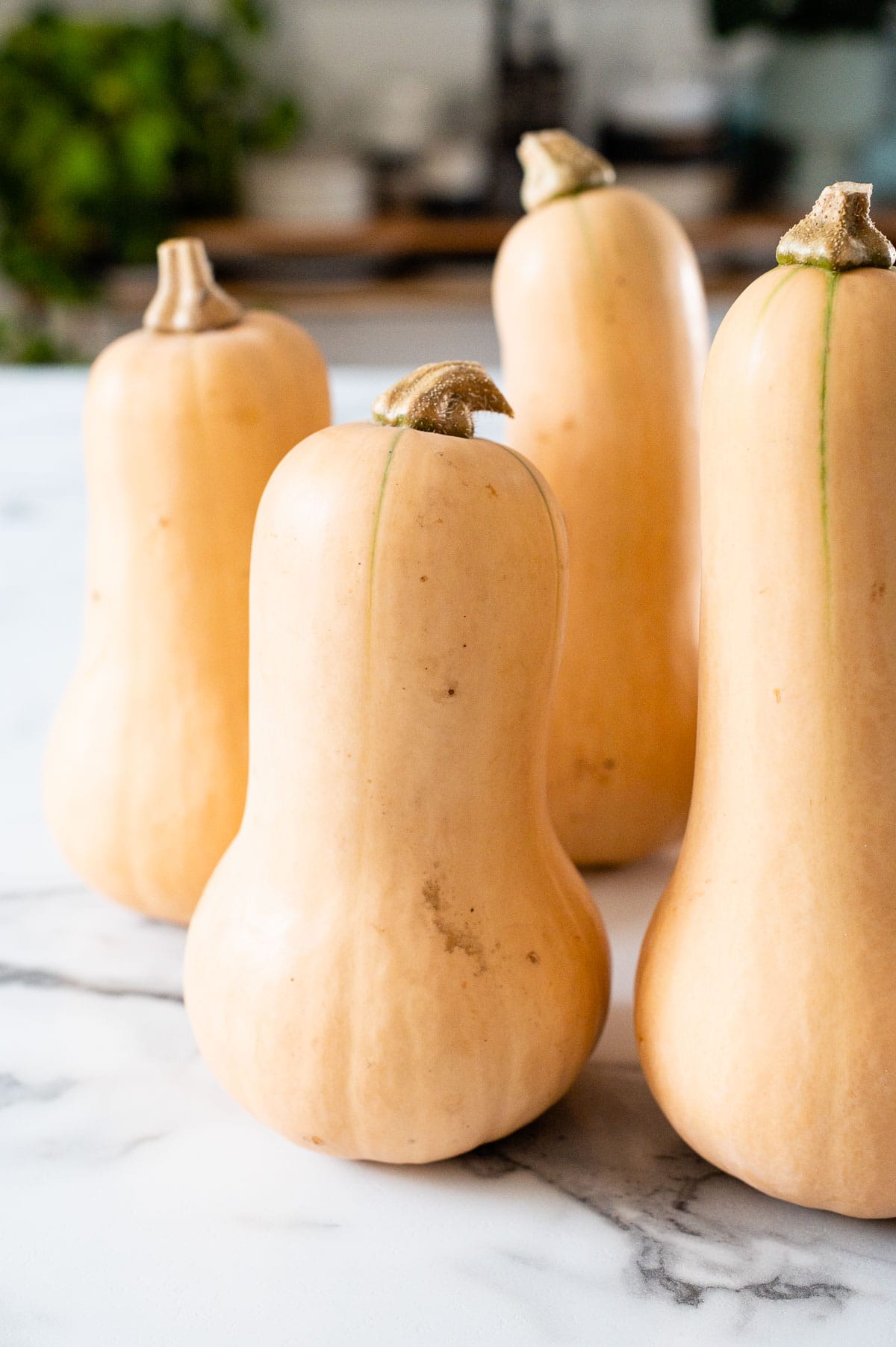
When Is Butternut Squash Ripe?
When you are shopping for squash, you may wonder how to pick a ripe butternut squash. Nothing is worse than picking a bad squash which could ruin your dinner plans!
- Color: Pick a squash with a solid beige color. There should be no brown patches or green discoloration.
- Weight: Ripe squash should be heavy for its size. If it feels light, it’s not ripe yet or it’s too old.
- Skin: The skin should have a soft matte finish vs. being shiny.
- Sound: Give the squash a small tap, it should sound hollow.
Tools You Will Need
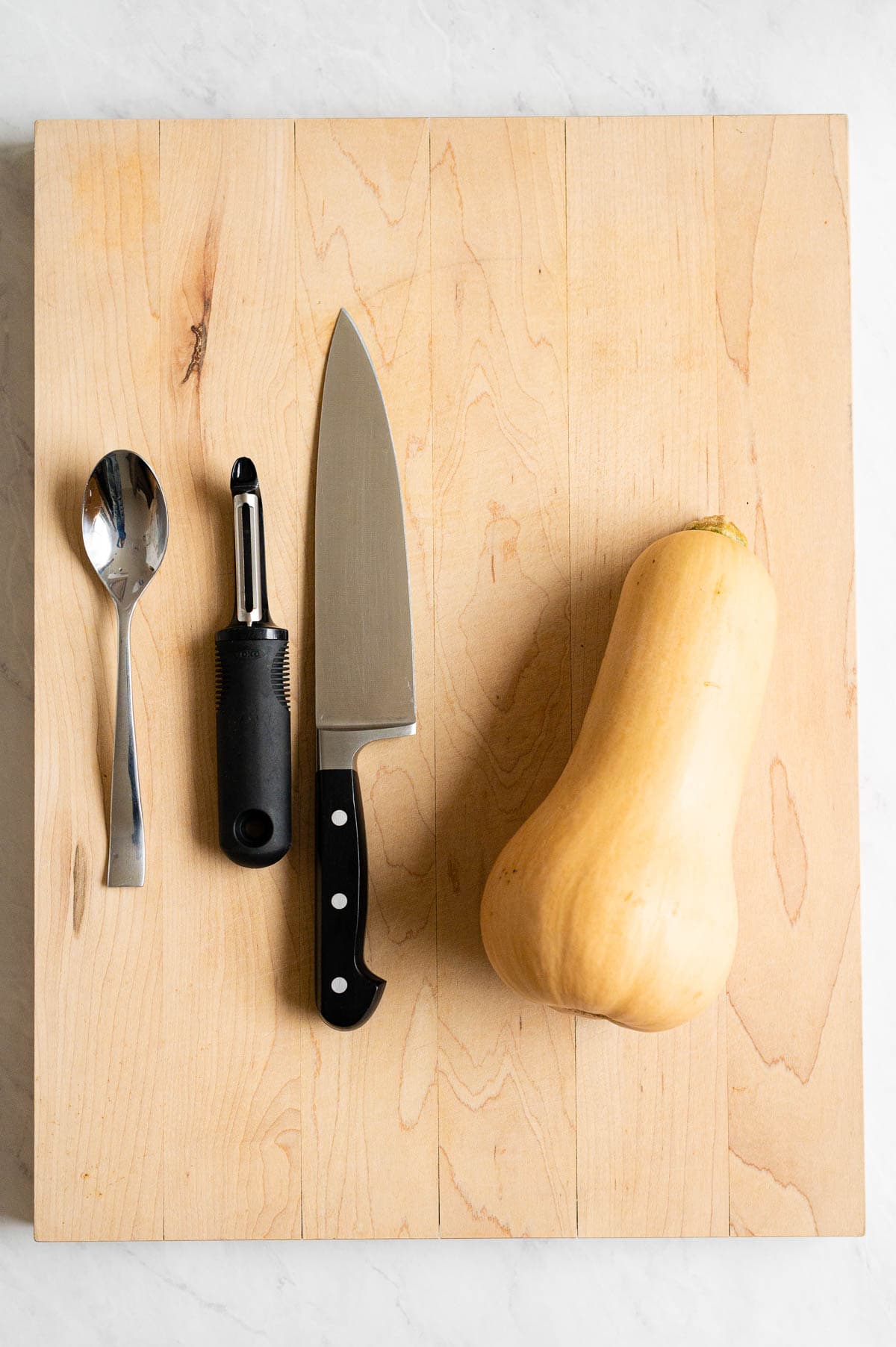
When peeling and cutting a butternut squash, right tools are a must! You will need the following kitchen utensils.
- Cutting board: A non slip surface like wooden cutting board for cutting your whole squash.
- Sharp chef’s knife: Large sharp knife for cutting into the squash. Dull knives is what causes injuries.
- Peeler: You can use a vegetable peeler (also known as potato peeler), swivel peeler, or Y peeler. I have this swivel peeler but apparently Y peeler gives you a better grip.
- Spoon: A large spoon is needed for scooping out the seeds. You could also use an ice cream scoop!
How to Peel Butternut Squash
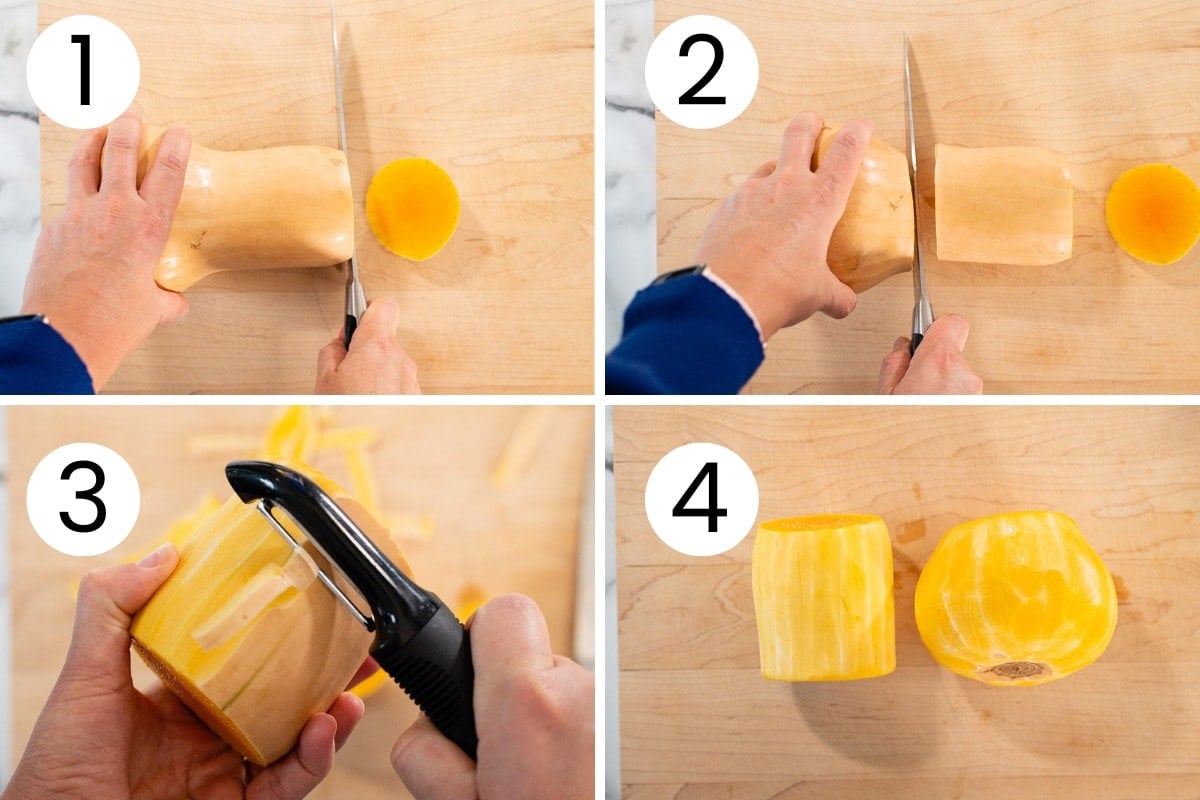
You could just run your peeler down the length of the squash, but I think the easiest way to peel butternut squash is first cutting the bulb portion off then peeling bulb and neck separately.
- On a flat surface, with a large chef’s knife, cut off the top (stem end) of the butternut squash.
- Holding onto the bottom of the squash, cut off the neck of the squash. This is right where the neck meets the base.
- Using a vegetable peeler, peel off the tough outer skin of both the neck and base to reveal the bright orange flesh of the squash.
How to Cut Butternut Squash
Once you peel butternut squash you can move onto the next step which is how to cube butternut squash the easy way!
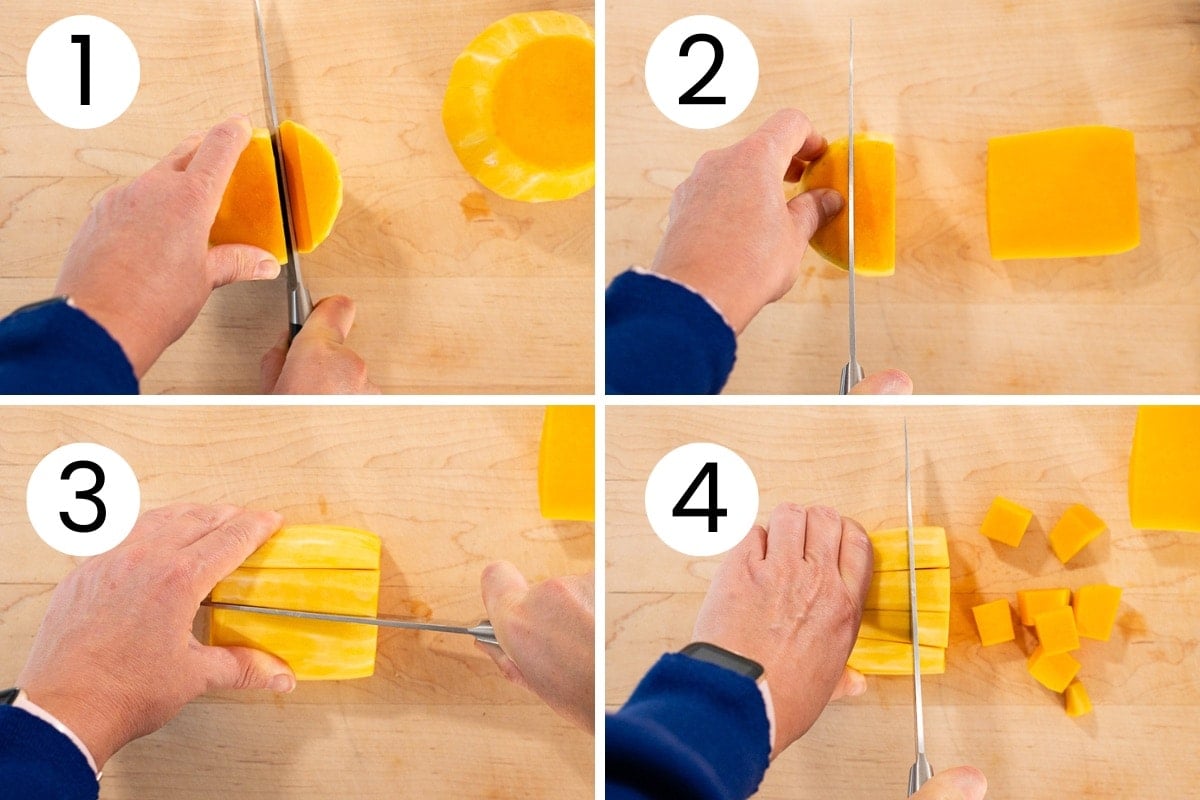
- On one side of the neck, cut a flat edge to use as a base.
- Cut a few more times into 1/4″ slices.
- Lay the squash on its now flat side and cut the slices into smaller strips.
- Then turn the strips and cut them crosswise into small cubes. Do the same with with cut of edge.
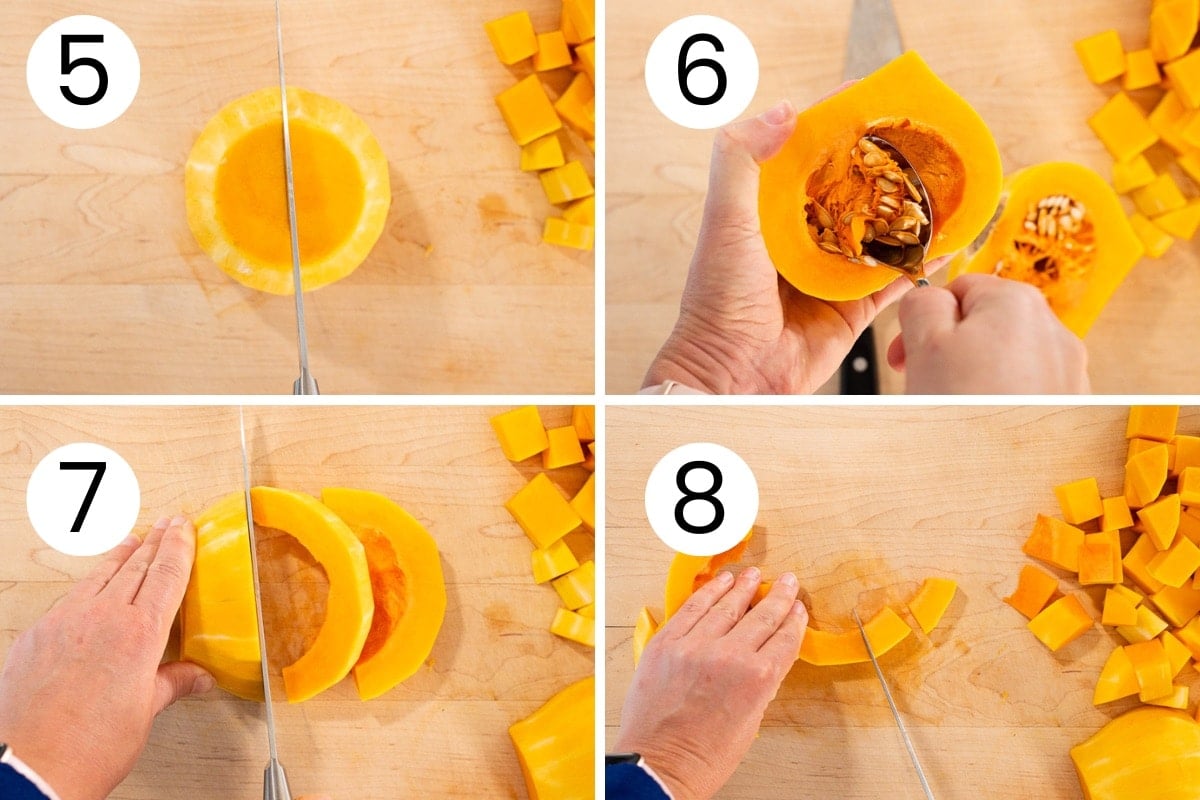
- Slice the base in half.
- Use a spoon to scoop out the seeds and stringy parts.
- Slice off the end of each base half, lie flat and cut into 1/4″ slices.
- Then chop slices crosswise into smaller squash pieces.
Recipe Tip
Save your seeds and roast them the same way as pumpkin seeds. Here is a quick tutorial how to cook pumpkin seeds in air fryer.
How to Soften Butternut Squash Skin
Squash has a tough skin that can hard to cut through not to mention tedious! If you prefer, you can first microwave butternut squash to peel. This will soften its skin, making it easier to peel.
While I do not find this a necessary step, here is how you can soften the skin first before peeling a butternut squash.
Using a fork, poke holes in the squash skin to let steam escape and prevent it from exploding. Five or 6 is fine. Microwave for 2 minutes, then proceed with peeling after it has cooled down enough to handle.
How to Store Butternut Squash
You may ask “How long does butternut squash last?”. Here are directions on how to store both cut and uncut butternut squash.
- Fresh whole butternut squash: Store your fresh butternut squash in a cool dark place. Depending how ripe it was when purchased, your squash should stay fresh for 1-3 months.
- Uncooked cubed butternut squash: Uncooked diced butternut squash can be stored in a sealed airtight container of the refrigerator for up to 3 days.
How to Freeze Butternut Squash
Having pre-cut butternut squash cubes in the freezer for meal prep is such a timesaver!
- Uncooked chopped butternut squash: To freeze butternut squash before you cook it, spread the cubes out in a single layer on a parchment lined baking sheet. Place in freezer until frozen then transfer to a freezer bag and freeze up to 3 months.
- Baked cubed butternut squash: Spread out onto a parchment lined baking sheet with no pieces overlapping. Freeze for a few hours until frozen then transfer to a freezer safe bag up to 3 months.
How to Roast Butternut Squash
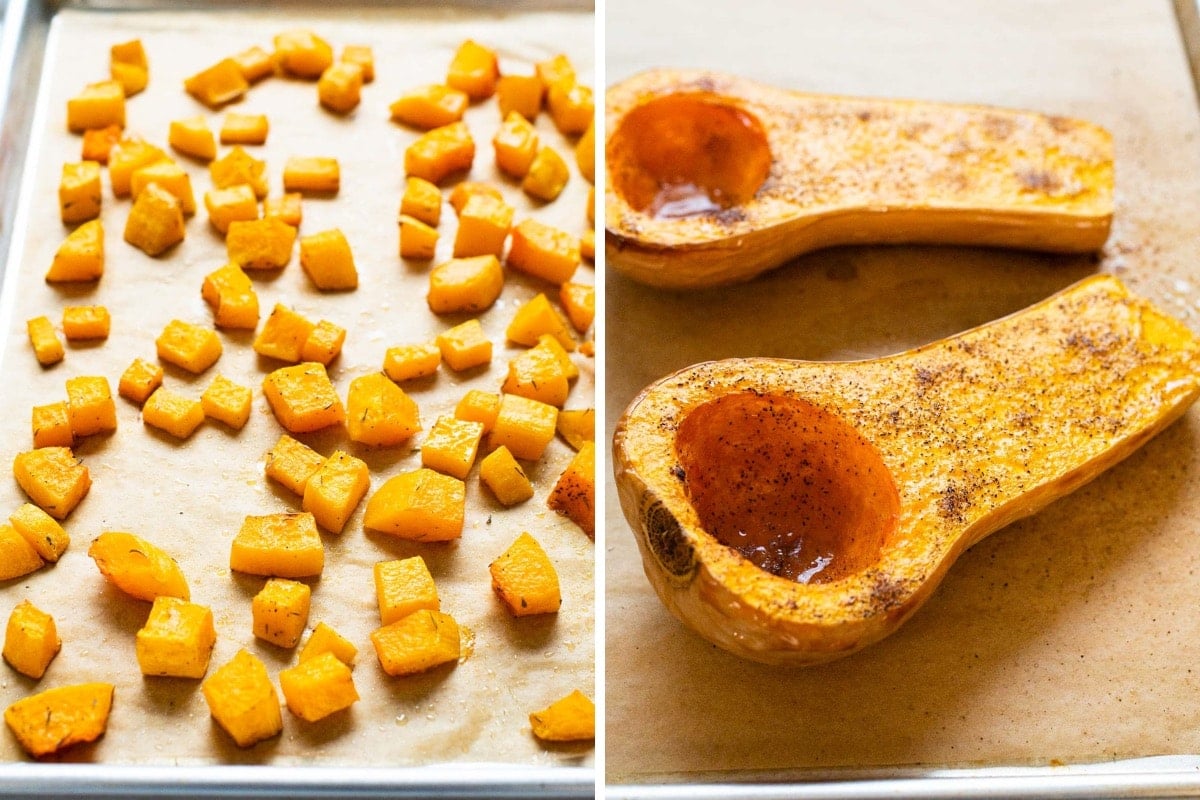
Cooking butternut squash is easy once you have learned how to peel and cube butternut squash! Here are a few popular ways:
- Roasted butternut squash cubes: This a favorite method for preparing delicious butternut squash cubes at a high oven temp. Evenly space butternut squash cubes on lined baking sheet, toss with olive oil, salt and pepper. Roast at 425 F degrees for 30-40 minutes until squash is tender inside and golden brown outside.
- Baked butternut squash halves: Cook your squash by cutting butternut squash into halves instead of cubes. Slice off the top of your squash and cut it lengthwise. Place on a lined sheet pan cut side up, rub with olive oil and sprinkle with salt and pepper. Bake at 375 F degrees for 50-55 minutes until tender.
FAQs
Yes, technically the skin of the squash is edible. Most recipes will call for it to be peeled though.
It has a slightly sweet, earthy, nutty flavor. When roasted it slightly caramelizes making it even tastier!
While healthy is subjective from person to person, butternut squash is very nutritious! It contains vitamin A, vitamin C, and potassium. It is also lower in calories yet high in fiber and a natural source of antioxidants.
Yes, using a small paring knife slice the skin off in long strips. It is much easier to learn how to prepare butternut squash with a sharp vegetable peeler though!
This will depend on the size of your butternut squash. A 2 pound squash will yield approximately 5-6 cups of cubed butternut squash.
More Butternut Squash Recipes to Try
This hearty root vegetable can be enjoyed in a variety of recipes, below are a few favorites! And if you love butternut squash, you probably also love other winter squashes, learn how to cut spaghetti squash next!
- Butternut squash soup
- Tex Mex butternut squash noodles
- Thai chicken butternut squash soup
- Instant Pot butternut squash soup
- Instant Pot whole butternut squash
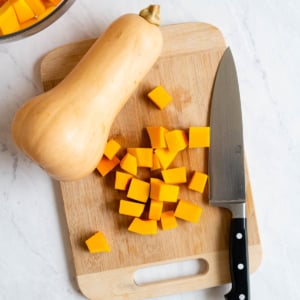
How to Peel and Cut Butternut Squash
Ingredients
- 1 butternut squash
Instructions
- With a large chef's knife, cut off the top of the butternut squash.
- Holding onto the base of the squash, cut off the neck of the squash. This is right where the neck meets the base.
- Using a vegetable peeler, peel off the skin of both the neck and base.
- Slice the base in half and use a spoon to scoop out the seeds and stringy parts.
- On one side of the neck, cut a flat edge to use as a base.
- Lay the squash on it's now flat side and cut into 1/4" slices.
- Cut the slices into smaller strips, then turn the strips and cut them crosswise into cubes.
- Slice off the end of each base half, lie flat and cut into 1/4" slices. Then chop the slices crosswise into cubes.
Notes
- Store: Store uncut squash in an airtight container in the refrigerator up to 5 days. Store cooked squash in the refrigerator for 3 days.
- Freeze: You can freeze both cooked and uncooked squash. Lay out cubes evenly on parchment lined baking sheet. Freeze until solid, then transfer into a freezer safe bag for storage up to 3 months.
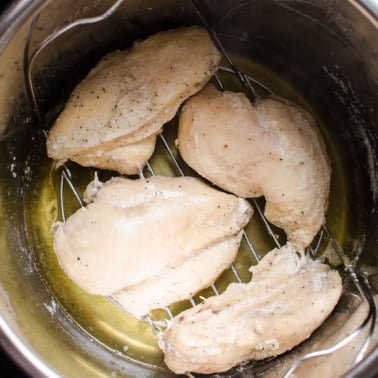
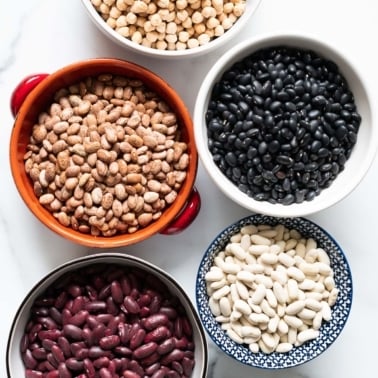
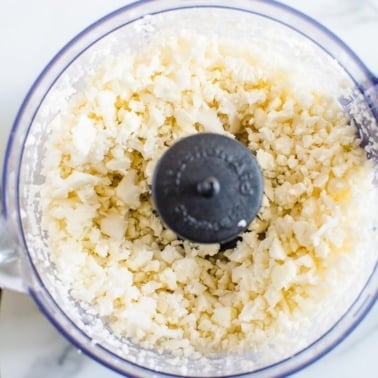









Thank you for this great post, it helped me alot!
I’m so happy to read this! Thanks for your positive feedback!